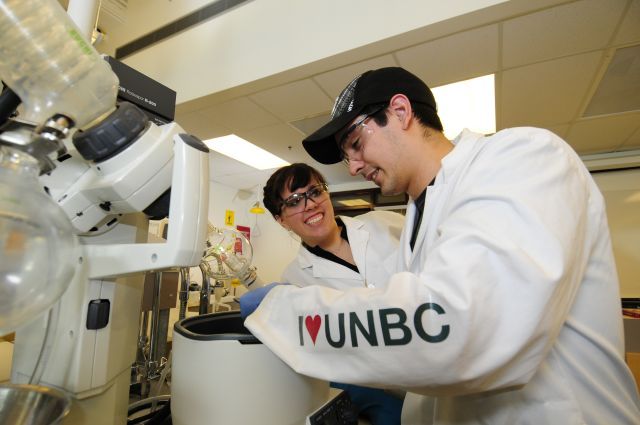
Chemistry is committed to offering a curriculum that meets the accreditation guidelines of the Canadian Society for Chemistry. While specialization in a number of sub-disciplines is possible, the Chemistry BSc at UNBC provides the necessary background and understanding for students to tackle any job within the realm of the working chemist.
The courses offered will serve as preparation for students that are contemplating advanced studies, whether they are at the post-graduate level in Chemistry or in other disciplines such as Medicine, Pharmacy, or Veterinary Medicine. Chemistry is fundamental to a number of other disciplines as well including Geology, Forestry and Biology.
In addition to the Chemistry stream, the program is offering a minor in Biochemistry, which compliments the life science programs. A degree in Biochemistry and Molecular Biology (BSc Program) is now being offered to compliment the Chemistry program.
Dr. Todd Whitcombe reflects on the first year UNBC opened
Exploring the Chemistry of Love with Dr. Whitcombe (CKPG News)
Areas of discipline
The program at UNBC focuses on the five primary disciplinary areas:
Analytical Chemistry
The determination of the amount of a compound present, what form it is in, and the structure of the complex. Job opportunities within this discipline are available with a number of large corporations interested in quality control and understanding environmental hazards.
Biochemistry
The molecules and chemistry of living organisms, from DNA to proteins to lipids to carbohydrates. This an area of recent growth within the chemical industry as many companies have shifted emphasis to bio-engineering techniques for the synthesis of pharmaceuticals and common chemicals.
Inorganic Chemistry
The study of the chemistry and reactivity of molecules built from all of the elements. The job opportunities in this area of chemistry are related to all areas of the manufacturing sector but in particular is the field of metal ion catalysis.
Organic Chemistry
The study of the synthesis and reactivity of compounds involving carbon atoms as a primary constituent. The synthesis of compounds from polymers, such as Nylon, to pharmaceuticals provides job opportunities for organic chemists.
Physical Chemistry
The measurement and calculation of the physical changes that chemical compounds undergo. Job opportunities range from the modelling of atmospheric release of chemical compounds to the synthesis of superconducting materials to the design and construction of new laser systems and fibre optics. In addition to the above areas, the Chemistry Program offers course in Environmental Chemistry and Advanced Research Techniques. Chemistry will also be offering courses in a number of joint degree programs with Physics, Mathematics, and Computer Science and within the Biological Technician Program.